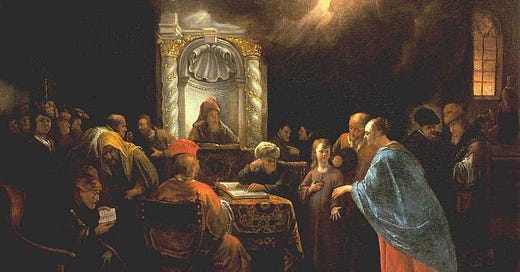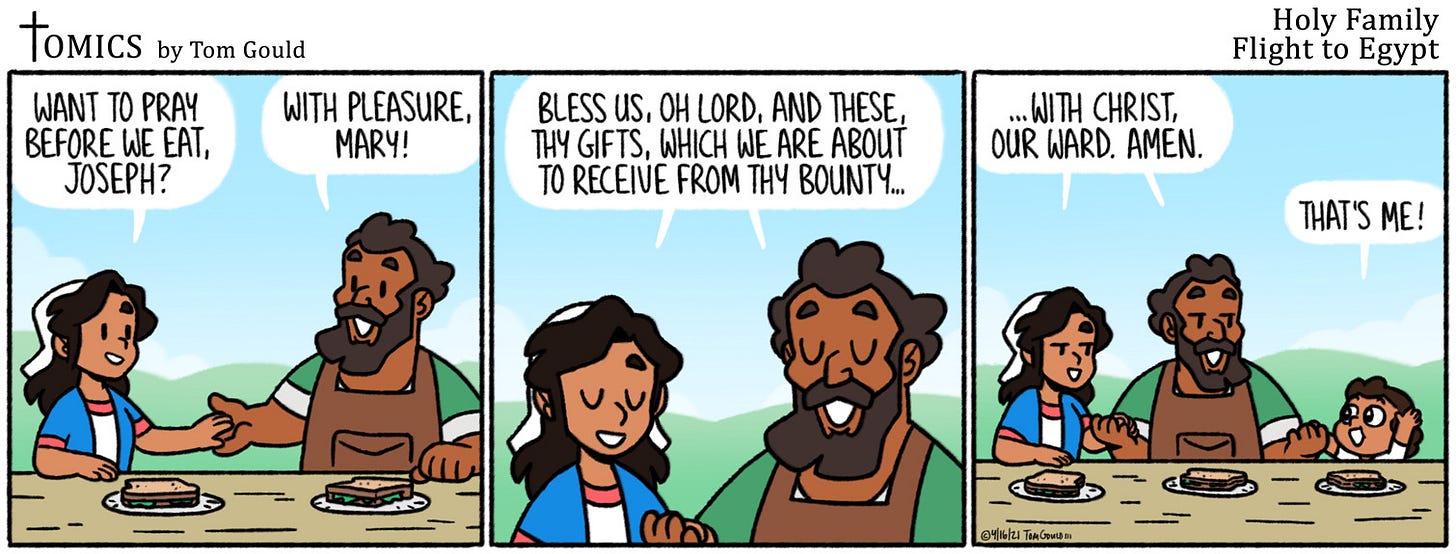The Holy Family is, of course, Mary, Joseph, and Jesus. That family is supposed to be a model for our own families—our households centered on God. It’s true of our extended families, too, our parish communities. God is big enough that He can be the center of all of them.
Reading 1
Sir 3:2-6, 12-14
God sets a father in honor over his children; a mother’s authority he confirms over her sons. Whoever honors his father atones for sins, and preserves himself from them. When he prays, he is heard; he stores up riches who reveres his mother. Whoever honors his father is gladdened by children, and, when he prays, is heard. Whoever reveres his father will live a long life; he who obeys his father brings comfort to his mother.
My son, take care of your father when he is old; grieve him not as long as he lives. Even if his mind fail, be considerate of him; revile him not all the days of his life; kindness to a father will not be forgotten, firmly planted against the debt of your sins —a house raised in justice to you.
Sirach is a wisdom book, meaning it’s not really a story, so much as a series of wise sayings. Proverbs gets all the attention, and to a lesser extent Wisdom, but Sirach shouldn’t be ignored.
To pagans, the gods were larger than life, literally too large to care about what mortals were up to. One of the biggest innovations of Jewish theology, besides monotheism, was that God is a personal god. He cares about each one of us individually.
Jesus, of course, took that further, and taught us that God is literally our Father. Sirach’s emphasis1 on our relationships with, and responsibilities to, our parents presages Jesus's teaching.
But also, you know, it’s good advice. Take care of your parents, even when their minds fail.
Responsorial Psalm
Ps 128:1-2, 3, 4-5
R. Blessed are those who fear the Lord and walk in his ways.
Blessed is everyone who fears the LORD,
who walks in his ways!
For you shall eat the fruit of your handiwork;
blessed shall you be, and favored.
R. Blessed are those who fear the Lord and walk in his ways.
Your wife shall be like a fruitful vine
in the recesses of your home;
your children like olive plants
around your table.
R. Blessed are those who fear the Lord and walk in his ways.
Behold, thus is the man blessed
who fears the LORD.
The LORD bless you from Zion:
may you see the prosperity of Jerusalem
all the days of your life.
R. Blessed are those who fear the Lord and walk in his ways.
A basic assumption in the bible is that families are great. This doesn’t always turn out to be true, but for the most part, a happy family is a reward for a life well lived.
Reading II
1 Jn 3:1-2, 21-24
Beloved: See what love the Father has bestowed on us that we may be called the children of God. And so we are. The reason the world does not know us is that it did not know him. Beloved, we are God’s children now; what we shall be has not yet been revealed. We do know that when it is revealed we shall be like him, for we shall see him as he is.
Beloved, if our hearts do not condemn us, we have confidence in God and receive from him whatever we ask, because we keep his commandments and do what pleases him. And his commandment is this: we should believe in the name of his Son, Jesus Christ, and love one another just as he commanded us. Those who keep his commandments remain in him, and he in them, and the way we know that he remains in us is from the Spirit he gave us.
God has adopted us, so we can be part of His family. That doesn’t mean in a vague, “found family” kind of sense—people who like each other and get along. In ancient times, an adoption meant full, legal rights, including inheritance. Being sons and daughters of God means we really, truly get to receive everything Jesus offers us.
Alleluia
Col 3:15a, 16a
R. Alleluia, alleluia.
Let the peace of Christ control your hearts;
let the word of Christ dwell in you richly.
R. Alleluia, alleluia.
Christ should be a part of our family, dwelling with us.
Gospel
Lk 2:41-52
Each year Jesus’ parents went to Jerusalem for the feast of Passover, and when he was twelve years old, they went up according to festival custom. After they had completed its days, as they were returning, the boy Jesus remained behind in Jerusalem, but his parents did not know it.
Thinking that he was in the caravan, they journeyed for a day and looked for him among their relatives and acquaintances, but not finding him, they returned to Jerusalem to look for him. After three days they found him in the temple, sitting in the midst of the teachers, listening to them and asking them questions, and all who heard him were astounded at his understanding and his answers.
When his parents saw him, they were astonished, and his mother said to him, “Son, why have you done this to us? Your father and I have been looking for you with great anxiety.”
And he said to them, “Why were you looking for me? Did you not know that I must be in my Father’s house?”
But they did not understand what he said to them. He went down with them and came to Nazareth, and was obedient to them; and his mother kept all these things in her heart. And Jesus advanced in wisdom and age and favor before God and man.
Luke’s infancy narrative begins in the temple, when Gabriel appears to Zechariah. Now it ends where it began, but now Jesus has entered His Father’s house. Zechariah questioned God’s messenger, and was struck mute; now, the rabbis question Jesus, and He answer them.
Mary and Joseph had believed Jesus was with their extended family somewhere in the caravan. Instead, Jesus was extending His family, by His earliest known preaching. He’s beginning the process by which all of humanity will be adopted by God the Father.
Well, technically, “Yeshua Ben Eleazar Ben Sira’s emphasis,” but that takes too long to write. So why did I write this footnote explaining that I didn’t want to write it? Your guess is as good as mine.




